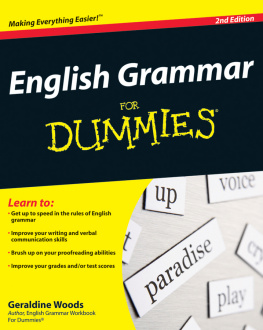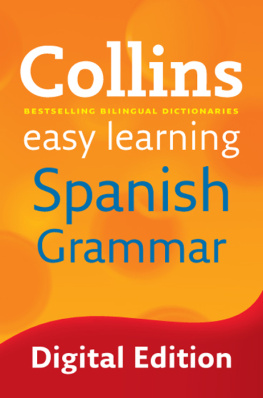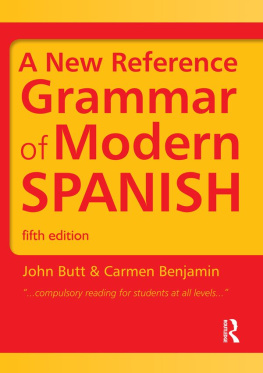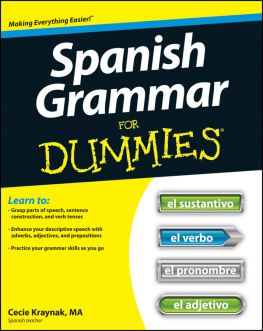Copyright 1993 by James Taylor and Nancy Stanley. All rights reserved. Except as permitted under the United States Copyright Act of 1976, no part of this publication may be reproduced or distributed in any form or by any means, or stored in a database or retrieval system, without the prior written permission of the publisher. ISBN: 978-0-07-150778-3 MHID: 0-07-150778-7 The material in this eBook also appears in the print version of this title: ISBN: 978-0-84-420798-8, MHID: 0-84-420798-5. eBook conversion by codeMantra
Version 1.0 All trademarks are trademarks of their respective owners. Rather than put a trademark symbol after every occurrence of a trademarked name, we use names in an editorial fashion only, and to the benefit of the trademark owner, with no intention of infringement of the trademark.
Where such designations appear in this book, they have been printed with initial caps. McGraw-Hill Education ebooks are available at special quantity discounts to use as premiums and sales promotions or for use in corporate training programs. To contact a representative, please visit the Contact Us page at www.mhprofessional.com. TERMS OF USE This is a copyrighted work and McGraw-Hill Education and its licensors reserve all rights in and to the work. Use of this work is subject to these terms. Except as permitted under the Copyright Act of 1976 and the right to store and retrieve one copy of the work, you may not decompile, disassemble, reverse engineer, reproduce, modify, create derivative works based upon, transmit, distribute, disseminate, sell, publish or sublicense the work or any part of it without McGraw-Hill Educations prior consent.
You may use the work for your own noncommercial and personal use; any other use of the work is strictly prohibited. Your right to use the work may be terminated if you fail to comply with these terms. THE WORK IS PROVIDED AS IS. McGRAW-HILL EDUCATION AND ITS LICENSORS MAKE NO GUARANTEES OR WARRANTIES AS TO THE ACCURACY, ADEQUACY OR COMPLETENESS OF OR RESULTS TO BE OBTAINED FROM USING THE WORK, INCLUDING ANY INFORMATION THAT CAN BE ACCESSED THROUGH THE WORK VIA HYPERLINK OR OTHERWISE, AND EXPRESSLY DISCLAIM ANY WARRANTY, EXPRESS OR IMPLIED, INCLUDING BUT NOT LIMITED TO IMPLIED WARRANTIES OF MERCHANTABILITY OR FITNESS FOR A PARTICULAR PURPOSE. McGraw-Hill Education and its licensors do not warrant or guarantee that the functions contained in the work will meet your requirements or that its operation will be uninterrupted or error free. Neither McGraw-Hill Education nor its licensors shall be liable to you or anyone else for any inaccuracy, error or omission, regardless of cause, in the work or for any damages resulting therefrom.
McGraw-Hill Education has no responsibility for the content of any information accessed through the work. Under no circumstances shall McGraw-Hill Education and/or its licensors be liable for any indirect, incidental, special, punitive, consequential or similar damages that result from the use of or inability to use the work, even if any of them has been advised of the possibility of such damages. This limitation of liability shall apply to any claim or cause whatsoever whether such claim or cause arises in contract, tort or otherwise.
INTRODUCCIN

GRAMTICA DE LA LENGUA INGLESA ofrece una introduccin moderna, sencilla y prctica, a lo ms esencial de la gramtica inglesa. Est diseada especficamente para los hispanoparlantes y trata los puntos que causan especial dificultad haciendo contrastes explcitos con el espaol. GRAMTICA DE LA LENGUA INGLESA es un libro de referencia, una herramienta que se presta al manejo individual.
Contiene ms de 200 ejercicios para aclarar los puntos clave e incluye las respuestas en una seccin aparte. Puede ser tambin de particular inters el segundo Apndice, el cual explica y ejemplifica ampliamente la relacin entre las estructuras gramaticales y las funciones comunicativas. Agradecemos a las muchas personas que con sus comentarios y sugerencias han mejorado este libro, y en especial al Profesor Manuel Luna Figueroa.
CONTENIDO
 1 SECCIN UNO
1 SECCIN UNO
ELEMENTOS DE LA ORACIN2 SECCIN DOS
LOS ARTCULOS Y DETERMINANTES3 SECCIN TRES
LOS SUSTANTIVOS Y LOS PRONOMBRES4 SECCIN CUATRO
LOS ADJETIVOS Y LOS ADVERBIOS5 SECCIN CINCO
LAS PREPOSICIONES Y LAS CONJUNCIONES6 SECCIN SEIS
LOS VERBOS: TIEMPOS Y MODOS1 LOS ELEMENTOS PRINCIPALES DE LA ORACIN
 The plane arrived
The plane arrived. En esta oracin hay dos elementos principales:
el verbo (arrived), indicando la accin, y
el sujeto (the plane), que realiza la accin. En espaol existe una oracin similar:
El avin lleg.
Tambin existe en espaol otra oracin: Lleg el avin. Tal inversin no es posible en ingls. En ingls el orden de las distintas partes de la oracin es mucho ms rgido que en espaol. En oraciones afirmativas en ingls el sujeto aparece antes del verbo. John piloted the plane. Esta oracin contiene tres elementos principales: el sujeto(quinpilote?-John), el verbo(qu hizo?-pilote) yel objeto(qu pilote?the plane).
En este caso, la oracin sera parecida en espaol. Pero si cambiamos el sustantivo plane por un pronombre, tenemos en ingls: John piloted it. Ahora en espaol cambiamos el orden: John lo pilote. En ingls sin embargo, el orden queda igual. En ingls el orden caracterstico para oraciones con un objeto es:  John bought Mary a ring. Exercise 1: En las siguientes oraciones, identifique los elementos numerados como: sujeto (S) verbo (V) objeto (O) objeto indirecto (OI) (Las respuestas a todos los ejercicios en el libro se encuentran en las pginas 135 a 142.)
John bought Mary a ring. Exercise 1: En las siguientes oraciones, identifique los elementos numerados como: sujeto (S) verbo (V) objeto (O) objeto indirecto (OI) (Las respuestas a todos los ejercicios en el libro se encuentran en las pginas 135 a 142.)  Exercise 2: Ordene las palabras para formar oraciones. stopped/car/the/./. _______________________________________________ cars/likes/John/./ ________________________________________________ him/Mary/ring/gave/a/./. __________________________________________ sent/Mary/he/letter/a/./. ___________________________________________ men/ate/the/./ __________________________________________________ enjoy/children/parties/./. _________________________________________
Exercise 2: Ordene las palabras para formar oraciones. stopped/car/the/./. _______________________________________________ cars/likes/John/./ ________________________________________________ him/Mary/ring/gave/a/./. __________________________________________ sent/Mary/he/letter/a/./. ___________________________________________ men/ate/the/./ __________________________________________________ enjoy/children/parties/./. _________________________________________
2 LOS VERBOS TRANSITIVOS E INTRANSITIVOS

I LOS VERBOS INTRANSITIVOS
Los verbos intransitivos son los que no necesitan ms elementos y que no pueden tener un objeto.
Ejemplos:The man arrived. 
















 GRAMTICA DE LA LENGUA INGLESA ofrece una introduccin moderna, sencilla y prctica, a lo ms esencial de la gramtica inglesa. Est diseada especficamente para los hispanoparlantes y trata los puntos que causan especial dificultad haciendo contrastes explcitos con el espaol. GRAMTICA DE LA LENGUA INGLESA es un libro de referencia, una herramienta que se presta al manejo individual.
GRAMTICA DE LA LENGUA INGLESA ofrece una introduccin moderna, sencilla y prctica, a lo ms esencial de la gramtica inglesa. Est diseada especficamente para los hispanoparlantes y trata los puntos que causan especial dificultad haciendo contrastes explcitos con el espaol. GRAMTICA DE LA LENGUA INGLESA es un libro de referencia, una herramienta que se presta al manejo individual.  The plane arrived. En esta oracin hay dos elementos principales: el verbo (arrived), indicando la accin, y el sujeto (the plane), que realiza la accin. En espaol existe una oracin similar: El avin lleg.
The plane arrived. En esta oracin hay dos elementos principales: el verbo (arrived), indicando la accin, y el sujeto (the plane), que realiza la accin. En espaol existe una oracin similar: El avin lleg.  John bought Mary a ring. Exercise 1: En las siguientes oraciones, identifique los elementos numerados como: sujeto (S) verbo (V) objeto (O) objeto indirecto (OI) (Las respuestas a todos los ejercicios en el libro se encuentran en las pginas 135 a 142.)
John bought Mary a ring. Exercise 1: En las siguientes oraciones, identifique los elementos numerados como: sujeto (S) verbo (V) objeto (O) objeto indirecto (OI) (Las respuestas a todos los ejercicios en el libro se encuentran en las pginas 135 a 142.)  Exercise 2: Ordene las palabras para formar oraciones. stopped/car/the/./. _______________________________________________ cars/likes/John/./ ________________________________________________ him/Mary/ring/gave/a/./. __________________________________________ sent/Mary/he/letter/a/./. ___________________________________________ men/ate/the/./ __________________________________________________ enjoy/children/parties/./. _________________________________________
Exercise 2: Ordene las palabras para formar oraciones. stopped/car/the/./. _______________________________________________ cars/likes/John/./ ________________________________________________ him/Mary/ring/gave/a/./. __________________________________________ sent/Mary/he/letter/a/./. ___________________________________________ men/ate/the/./ __________________________________________________ enjoy/children/parties/./. _________________________________________